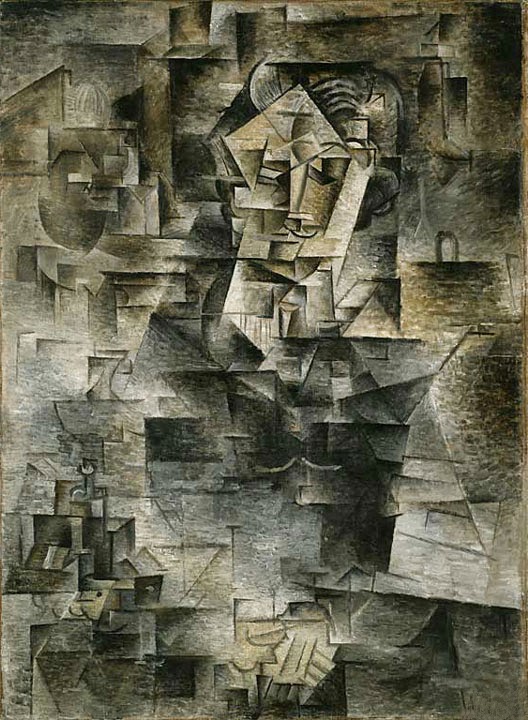Identifying blocks to creativity is the first step to obliterating them. I like to call one block I have noticed the Picasso Problem. The incredibly prolific artist didn't just find a niche and produce lots of work. He kept reinventing himself and he kept producing.
The total number of artworks Picasso produced has been estimated at 50,000 comprising 1,885 paintings; 1,228 sculptures; 2,880 ceramics, roughly 12,000 drawings, many thousands of prints, and numerous tapestries and rugs. - Wikipedia
Portrait of Daniel-Henry Kahnweiler - Pablo Picasso
Source - Wikipedia
Whether extreme confidence or just a complete lack of respect for anyone else's opinion, he was not held back by the fact that he couldn't do something or that people would be 'judging' him. He just carried on. This fearlessness meant the creative juices gained momentum and he became used to breaking new ground. I am sure he considered much of his work 'mistakes'. Rather, others would have considered paths he went down mistakes but in experimenting some of the stuff would have worked and some of it wouldn't and he would have been learning all the time. A current artist friend of mine reminds me of this type of approach. John Bauer from Cape Town lives a few houses down from where I was before I crossed the pond. He lives in amongst his art and his house is bulging (and overflowing) at the seams with work. There is no such thing as a mistake in John's world. He dives into Porcelain in every way possible and becomes intimate with any of its possibilities. Rummaging through his house you will find a little magic.
John's Studio/House/Gallery/Playground is bursting at the seams with work
An example of one of John's bowls from a 2011 series
There is a momentum to creativity. I believe part of the trick to getting that going is just getting that going. If you want to write better - write more. If you want to learn to paint, you have to pick up a paint brush. All this sounds condescendingly obvious but I think what holds us back is a fear that what we produce won't be of a good quality. Perhaps this comes from our early years at school as things increasingly became for marks. The more we get evaluated, the more our identity gets tied up with the work. Since creative pursuits are so personal and there is no obvious right and wrong it can get you incredibly wound up. There are some techniques you either can or can't do. That can be corrected with a little work. When it comes to the juice of your work though, you can feel like when someone crits your work, they are critting your soul. So many don't produce. This isn't just external. We are often our own worst critic and so don't experiment, play and flow.
We want every utterance to be creative genius or not at all. De Botton talks in 'How Proust Can Change Your Life' about how different Proust's later drafts were from early drafts. In conversation he was not nearly as eloquent as once he had finely crafted the work. You write the tenth draft by writing the first draft first. Steven Pinker's new book 'The Sense of Style' gives a guide to how to think about refining your writing whether you are an Academic, a Lawyer, a Teacher, a Marketer or you are writing for writings sake. The first step though is that you need to get words on a page. You need to solve the Picasso Problem. You can't wait for creativity to come to you. You need to do the work. Perhaps inspiration isn't an epiphany, it is an afterthought.
There is a beautiful film about the life of Amedeo Modigliani who was a rival of Picasso. Picasso became very successful and so some of the other obstacles to creativity (like lack of money) fell away. The movie does touch on some other sources of inspiration. Getting a little banter and rivalry going can be a great impetus. You may be lucky enough to have a muse. Pablo's solution to the problem of how to start, was to start. Every day.




No comments:
Post a Comment